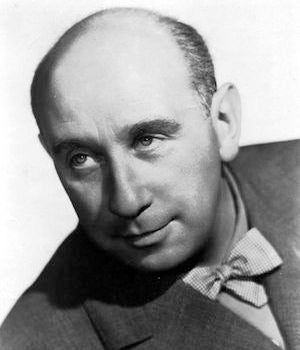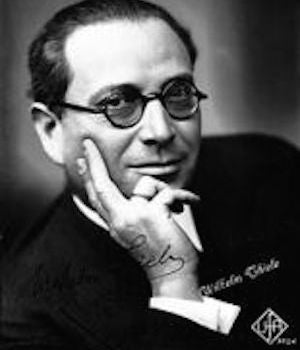In June 1975, 40 years ago, I visited Los Angeles for the first time. I had just finished my Master of Science in Communications at Boston University with a thesis on Ernst Lubitsch and the rise of the UFA Film company, and had been offered a grant from the American Film Institute’s oral history program to interview German-Jewish refugees who had fled Hitler and gone to Hollywood. At the time, the program was funded by the Louis B. Mayer Foundation, and I had applied with a proposal to follow Lubitsch’s footsteps (and those of many others) to Los Angeles and research their integration into the studio system.
The stipend for the whole project was a whopping $750, so I boarded a plane to L.A. At LAX, I was picked up by a friend and colleague from BU, who was visiting her mother in Sherman Oaks and invited me to stay there. For the first week, I tried to get around town on a bus, but after almost being arrested in Bel Air for walking on the street, I rented a wreck. Coming from a very compact and easily accessible city like Boston, I was fascinated by the mountains and canyons in the city (and the fauna, which reminded me of my parents’ home in northern Italy), but I was also repelled by the sheer distances that needed to be traversed for daily activity.
Back then, the American Film Institute and its Center for Advanced Film Studies was housed in the old Greystone Mansion up Doheny Drive in Beverly Hills. That was my first stop, where I met James Powers, who was the Director of the Center’s educational programs and the administrator for the L.B. Mayer Oral History program. Powers had come to the AFI as Director of Publications in 1972, in order to reboot the “Dialogue on Film” interview seminars, published irregularly since 1970, but continued under Powers as a bi-monthly magazine in 1972, and then, with the birth of American Film in December 1975, was incorporated into that publication. Under his guidance, the journal published seminars with Hollywood’s guiding lights, including Steven Spielberg, Martin Scorsese, Bernardo Bertolucci, Charles Chaplin and countless others. He continued producing “Dialogue on Film” and functioning as the West Coast editor of American Film, until his sudden passing on July 4 in 1980.
Born in 1918, James Dustin Powers started out as a journalist, working for the New York Daily News and the International News Service in New York. In 1952, he moved to Los Angeles, becoming a founding member of the Los Angeles Drama Critics Circle and its president. In 1955, he joined the staff of The Hollywood Reporter, briefly shifting to Daily Variety (1958-1960), before returning to the Reporter and becoming their editor (1966-1971). He briefly worked as a publicist, winning a Publicists Guild press award, before moving to the AFI.
1955, he joined the staff of The Hollywood Reporter, briefly shifting to Daily Variety (1958-1960), before returning to the Reporter and becoming their editor (1966-1971). He briefly worked as a publicist, winning a Publicists Guild press award, before moving to the AFI.
James was particularly interested in my German émigré topic, because he had been married to the late Kaaren Verne, who had previously been married to Peter Lorre. Kaaren had been born in Berlin, a relative of the famous Bechstein (piano) family (which supported Hitler), but had fled in 1938 and started acting in British films, then was featured in American films. She was with Lorre from 1945-1950, and with Powers from 1951 until her death in 1967. The couple had remained friends with Lorre and even his previous wife, Celia Lovsky, who had emigrated with Lorre from Germany and made her living as a bit actress in Hollywood. Lovsky became one of my first interviewees.
Powers’ connections in the German émigré community got me interviews with both leading figures in the émigré community, such as Wilhelm Thiele, Henry Koster, Walter Reisch, Henry Blanke, Joe Pasternak, John Brahm and Francis Lederer, and minor players like Rudolf Anders, John Mylong-Münz, Fritz Feld and Gusti Adler (Max Reinhardt’s longtime secretary). Most of my interviewees were extremely gracious with their time, despite the fact that I went into most of the interviews with only minimal preparation.
Joe Pasternak, John Brahm and Francis Lederer, and minor players like Rudolf Anders, John Mylong-Münz, Fritz Feld and Gusti Adler (Max Reinhardt’s longtime secretary). Most of my interviewees were extremely gracious with their time, despite the fact that I went into most of the interviews with only minimal preparation.
My understanding of the German émigré community would not increase until after I begun serious research the next year, while transcribing my interviews and beginning a systematic filmography of over 500 German-speaking film workers who ended up in Hollywood.
Jim Powers also asked me at some point whether I would like to meet Fritz Lang, and for reasons that are unclear to me now, I turned him down. I think I told him that every interview I had ever read with Lang had sounded the same, so I felt I would not be able to coax anything different out of him. I was young and stupid. Today I would have gone, just to experience the man.
(Pictured right: John Brahm, Wilhelm Thiele)
< Back to Archival Spaces blog






 Mobile Navigation
Mobile Navigation

